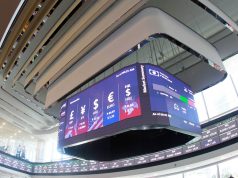Factories seen to face challenges
BUSINESS CONDITIONS for manufacturers in the Philippines can be expected to continue “modest” improvement in the face of an escalating Sino-US trade war that weighs on global growth prospects, a Cabinet official and private sector economists said on Tuesday.
The IHS Markit ASEAN Manufacturing PMI (purchasing managers index) for August that was released yesterday showed the Philippines — with its 51.9 headline reading — displacing Vietnam (51.4) to regain second place for the first time since February, falling right behind topnotcher Myanmar (52.0). ASEAN’s reading was 48.9 in August, compared to 49.5 in July, “signalling further deterioration.”
The PMI is made up of five indices: new orders, output, employment, suppliers’ delivery times and stocks of purchases. PMI readings above 50 signal improvement in operating conditions from the preceding month, while those below that point denote deterioration.
The PMI is not comparable to the Philippine Statistics Authority’s Monthly Integrated Survey of Selected Industries (MISSI), which is based on year-on-year changes in volume and value of production. The latest MISSI showed factory output — as measured by volume of production — dropping 9.6% last semester compared to 13.5% growth in 2018’s first half. The MISSI has been contracting since December last year.
Sought for comment, Trade and Industry Secretary Ramon M. Lopez said that resilient demand at home will support manufacturing. “The external economy is a small part of our total economy. ‘Yung domestic demand naman ang malakas (domestic demand is strong), so manufacturing is still expected to post modest growth,” Mr. Lopez said by phone. “Pag tumagal ‘yung (If the) global slowdown (persists), it might also affect later on ’yung performance din ng ating bansa (the performance of our economy).”
ING Bank NV Manila Branch senior economist Nicholas Antonio T. Mapa said in an e-mail that while “manufacturing geared towards exports may be vulnerable to the trade war… the PHL export sector has eked out a nice run of successive months of expansion as exports to the US picked up.”
Michael L. Ricafort, economist at Rizal Commercial Banking Corp., said slowing global economic and trade growth due to the escalating Sino-US trade war and uncertainties surrounding the United Kingdom’s impending exit from the European Union, as well as lingering effects of last year’s fast inflation and high inflation rates “partly slowed Philippine manufacturing, as… reflected in the slowdown of Philippine exports.”
At the same time, “[l]ocal manufacturing activities and growth could pick up in the coming months of 2019, as inflation has already eased significantly and long-term interest rates have already eased to new lows in 2-3 years, thereby [these factors] could encourage more borrowings with much lower financing costs and investments/capital formation for new manufacturing facilities and expansion projects,” Mr. Ricafort said in an e-mail.
Moreover, increasing state spending, “especially on infrastructure for the rest of the year — including catch-up spending [from a year-on-year drop last semester amid a three-and-a-half month delay in national budget enactment] — would also support faster growth in allied industries such as construction, materials and other manufacturing industries.
It will also help, however, that the government promptly enacts the proposed amendment to the country’s fiscal incentive package — which will remove tax perks deemed redundant and make such incentives timebound and performance based — in order to remove uncertainty on this matter that has been keeping prospective investors out.
Foundation for Economic Freedom President Calixto V. Chikiamco, in a Viber message, cited the need to resolve this uncertainty on the fate of tax incentives, as well as pending stricter rules on labor contracting. — B. M. Laforga with DAV



